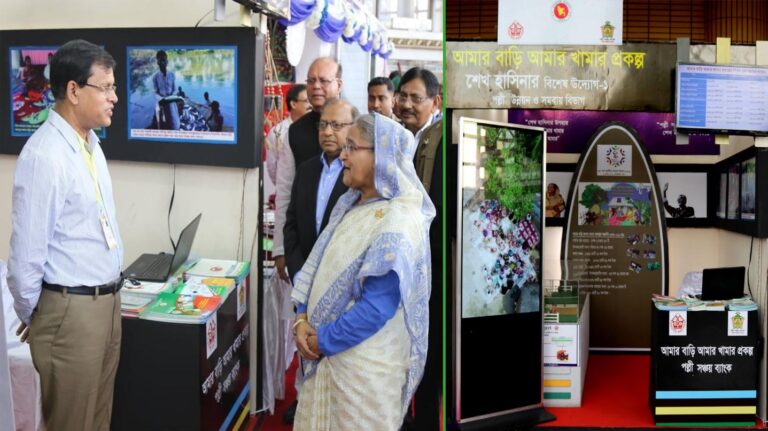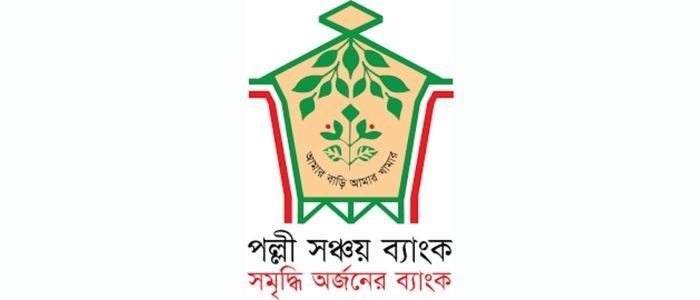Marzan Binte Monwar –
Shahana Begum is a typical 33-year-old village woman in Bangladesh. She owns 2 cows, 1 calf, and 3 goats. She has a sewing machine and an auto-rikshaw as well. Every month, she earns at least 15 to 20 thousand takas as profit on her own. According to Shahana, the best part of earning is acceptability and dignity from her husband and family. However, things were quite different just 3 to 4 years back when she was a housewife and was hardly treated with honor.
She came to know about the government project “Ekti Bari Ekti Khamar” from a field officer but did not find it appealing then. After some months, she decided to be a part of this project witnessing the progress of other beneficiaries. Loan taking process was so easy that she took her first loan of 10 thousand takas and got basic training in dairy. First, she bought a goat, and eventually with the profit, she bought a calf, then a cow, and finally an auto-rikshaw which is on rent now. This is the life-changing story of Shahana where she became self-reliant from an ordinary homemaker.
Apart from Shahana, millions of unemployed youth, housewives, and poor farmers of Bangladesh have alleviated poverty by taking loans from this project. The real aim and objective of this program are to increase the self-awareness of the neglected and deprived women of the country, protect their rights and make them self-reliant by uncovering their productivity.
The honorable Prime Minister’s special initiative for poverty alleviation “Amar Bari Amar Khamar” (ABAK) Scheme (formerly known as “Ekti Bari Ekti Khamar”) was taken up in 2009 and ended in June 2021. In 2014, “Palli Sanchay Bank” (PSB) was established with the intention of the Prime Minister to institutionalize the activities of this project.

Farmers are the lifeblood of agriculture-based Bangladesh. The farmer who grows crops, can again cultivate fish, poultry, cows, and goats and grow vegetables in the yard when is an uncultivable season. Although so many farmers have dreams of making such a family farm, they are unable to do so due to a lack of capital. To stand by those marginalized people, ABAK is playing a pivotal role.
The ABAK project is a long-term social plan based on a cooperative society adopted by the Government of Bangladesh. Under this project, an initiative has been taken to improve the socio-economic condition of the rural population by making the poor families of the village economic units. This project was undertaken to bring down the poverty rate in the country to 10 percent by 2020.
With the aim of integrated village development, initiatives were taken to implement the “Ekti Bari Ekti Khamar” scheme to make each house a focal point of economic activities. This project has been implemented in 40,950 villages of 4,503 unions in 490 Upazilas of 64 districts. The current capital of the scheme is 8 thousand crore taka. Under this project –
-
Societies formed – 1,20,325
-
Beneficiary member families – 56,77,000
-
Member savings – 2,086 crore taka
-
Bonus, given by the government – 2000 crore taka
-
Revolving fund – 3200 crore taka
-
Total number of beneficiaries taking loans – 45,93,000
-
Total loan disbursement – 11,041 crore taka
-
Small entrepreneur development loan disbursement – 490 crore taka
-
Actual number of small and small income-generating farms – 33,73,000
-
Total fund – 7609 crore taka
All these data are up to 30th June 2021. The scheme expired on this date and then converted to the present permanent form “Palli Sanchay Bank”.
Under this project, village development societies were formed with 60 poor people in each village with 40 female and 20 male members. A bank account is opened in the name of each association. The most favorable part here is the service charge being only 8 percent, which is the lowest compared to any other loan-giving institution.
According to sources, the ABAK project has been working with “Palli Sanchay Bank” since 1st July 2016. Beneficiaries of the project own 49 percent of this bank as it was built with the small savings of the members of the ABAK project. By saving 200 takas per person per month, the beneficiaries of this scheme are now 49 percent shareholders of “Palli Sanchay Bank” and are self-reliant with their savings.
At the beginning of the ABAK project, it was mandatory to have at least 40 women members out of the 60 in each society. Dipankar Roy, General Manager of “Palli Sanchay Bank” said, “If there are 60 lakh members in the rural savings bank now, 40 lakh are women members out of them.” This proves that there was an underlying objective of making rural housewives economically independent through this project. On the other hand, the ABAK project made women not only economically self-reliant but also taught society to be sensitive towards women.
ABAK project created cooperative-based “Village Development Organizations” for poor village people based on an initial survey. Then through this, it provided various skill-building training, loans, grants, and technical assistance to the members and also provided dairy cows, fish, poultry, and livestock among the poor. Crop seeds were distributed. A campaign was created as well to raise awareness on the prevention of dowry and child marriage.
This project is playing a role in changing the fate of millions of women across the country. Poverty alleviation and self-employment opportunities are created by providing loans to poor, distressed, and helpless women to improve their quality of life with the use of sanitary latrines, sending children to school, adopting birth control, getting access to primary health care, immunization of children, prevention of dowry and child marriage, etc.
But there’s an opposite scenario too. Morzina Begum (anonym), a poor village housewife, cumulated 6 thousand takas of her hard-earned money in “Palli Sanchay Bank” with the hope that she can get back 12 thousand takas and can start a small business with her elder son as her husband had a major accident and become disabled. But she was told that she would receive the same amount that she credited! She not only cursed her fate but blamed the whole project as the reason for her miserable life becoming more miserable!
So what happened in this case? As a surveyor, I witnessed such a situation several times. The fact is in some areas, field workers misinterpreted the aims, objectives, and functions of the ABAK project. Thus villagers were misled with the hope that they would be refunded double the money which was credited.
Again, there are some other drawbacks to this project. Many of the beneficiaries did not get the proper training so many of them did not get proper knowledge about the ABAK project or “Palli Sanchay Bank”. Project members had trouble communicating with field workers. Allegations of various irregularities and corruption have been made against the officers and field assistants of the ABAK project and “Palli Sanchay Bank” by numerous villagers.
There are complaints that members are not given passbooks. Some field assistants left the book talking about the audit. Some are alleged to forge all the signatures of the members of the association/president/manager and management committee on the loan form and resolution book. There are complaints of bad behavior against the field assistants and officials.
There are also allegations of irregularities in depositing money. Receipts are supposed to be given to the members after depositing the money, which is often not provided. Many times the loan is not given even with a large sum of deposit money. There are many such irregularities and corruption allegations against the officials. If these accusations were tackled with a strict hand, the whole scheme would have brought out more tremendous consequences.
The Honorable Prime Minister Sheikh Hasina’s special ten initiatives are one of the steps in Bangladesh’s development progress. In these ten initiatives, special programs on women’s empowerment have been taken separately. On review, it can be seen that the path of women’s empowerment has been widened somehow in all the ten initiatives where ABAK is undoubtedly mentionable. More than 60 percent of the beneficiaries who became self-reliant through the ABAK are women. Despite the drawbacks, about 2 crore families in the country have been lifted out of poverty and self-reliant through this project.
The importance of the Amar Bari Amar Khamar (ABAK) Project in achieving the United Nations Sustainable Development Goals or SDGs is unprecedented in the country as well as globally. It aims to create a permanent fund for the upliftment of poor people through a house and a farm scheme, through which poor people can cross the poverty line.




An initiative that deserves recognition and credibility.